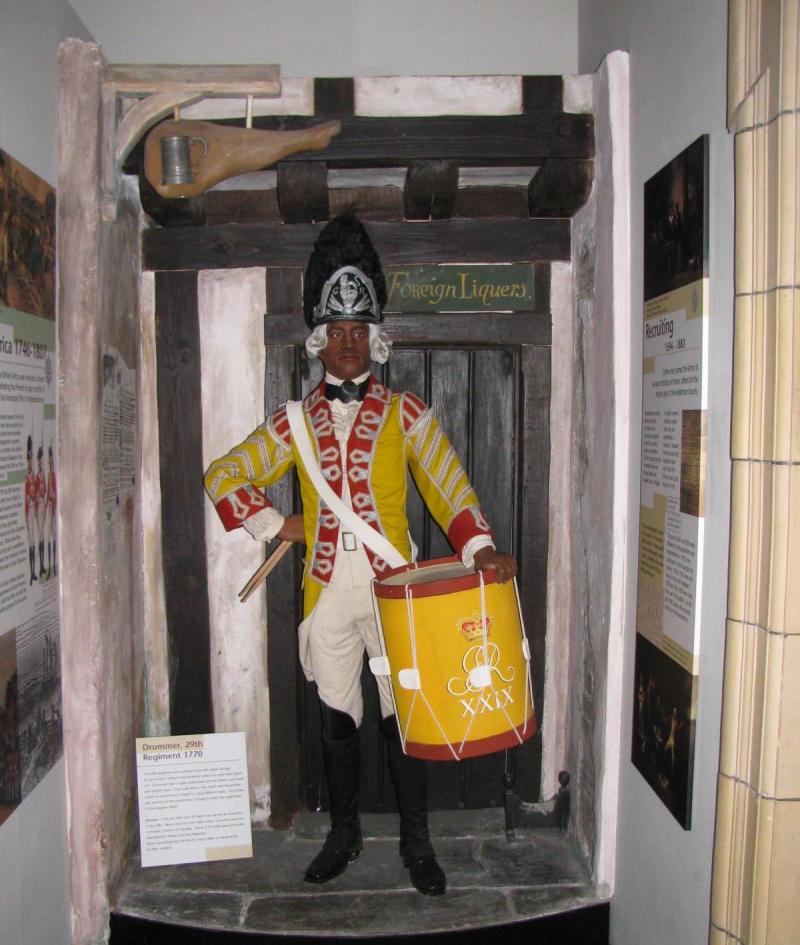But on 6 Feb 1769, the Whig-leaning Boston Gazette and Boston Evening-Post ran this advertisement:
The Subscribers to the Concert,So the biweekly musical assemblies were back on, with just a two-day delay that week.
which was to have been on Wednesday Evening the 8th Instant, are hereby notified that it will be on Friday the 10th, at Concert-Hall; and after that will be continued every other Wednesday, during the Season.
In their “Journal of Occurrences,” the Boston Whigs tried to spin the resumption of concerts in their favor on 16 February:
A concert hall is again opened to all who have, or may commence subscribers to such musical entertainments. We are told proper concessions have been made Mr. [Stephen] D[e]bl[oi]s, and that G[eneral] [John] P[omero]y, has engaged that the o—ff[ice]rs of his core, shall for the future behave with decency, and agreeable to the regulations of such assemblies.And there was no further commotion. On 29 May, the Boston Chronicle announced:
The Subscribers to the Wednesday-Night CONCERT, are hereby notified, that said Concert will end, Wednesday next.The season thus passed without giving the Whigs anything further to complain about.
N.B. Any Gentlemen who are not Subscribers and Ladies, will be admitted to said Concert, at Concert-Hall, paying half a Dollar each.
The Concert begins at half after Seven.
No Subscribers will be admitted without delivering his Ticket.
Concert Hall wasn’t the only venue offering musical entertainment that winter, and I’m not talking about James Joan’s “Music Hall.” On 17 February the Whigs ran another dispatch:
There has been within these few days a great many severe whippings; among the number chastised, was one of the negro drummers, who received 100 lashes, in part of 150, he was sentenced to receive at a Court Martial,—It is said this fellow had adventur’d to beat time at a concert of music, given at the Manufactory-House.The drummers of the 29th were black, bought or recruited in the Caribbean. At first Bostonians had viewed them as a curiosity, then as a threat to the regular social order since drummers were tasked with carrying out the whippings and other corporal punishments in a regiment. But here, when a drummer was receiving punishment, the Whigs were mildly sympathetic to him.
It’s unclear why a regimental drummer would be punished for playing at a concert. Soldiers were allowed to earn money by taking jobs in their off-hours, and other sources show regimental musicians giving private concerts. Indeed, it’s possible that much of the band at the subscription concerts had come from the army. Perhaps this drummer played the concert when he was supposed to be on duty, or had been expressly told not to play at the Manufactory given its recent history as a battleground between army and locals. The Whigs might have neglected to include such a detail.
This news item is another odd link, after Pvt. William Clarke’s play The Miser, between the Manufactory building or its tenants the Browns and popular entertainment. Perhaps as immigrants the Browns just didn’t share Boston’s traditional resistance to such public frivolities. But any “concert of music” at the Manufactory was probably meant for a lower-class audience than the assemblies at Concert Hall.

Can't help but wonder if the poor drummer was whipped because of the type of drumming, i.e., his own Afro-Caribbean style, rather than the fact that he drummed. I would suspect such a display by a memeber of the King's troops might be frowned upon.
ReplyDeleteIf the record of this man’s court-martial ever turns up, it could shed more light. I haven’t come across any complaints about how the 29th’s drummers actually drummed, though.
ReplyDeleteIt was not unusual for drummers to play other instruments besides drums. Standing orders for the 37th Regiment of Foot written during the early 1770s, for example, directed “every Drummer to be taught the fife, and every fifer the Drum.” And the ad below, although pertaining to a fifer, shows the musical versatility that some of these men had. So it is entirely possible that the drummer from the 29th Regiment played some other instrument at the concert in Boston.
ReplyDelete"Perth Amboy, New-Jersey, Sept. 6, 1770.
Deserted from the 29th Regiment of Foot, William Simpson, Fifer, aged 19 Years, 5 Feet, 8 Inches high, born in the Regiment, straight and well made, fair Complexion, thin Face, long Visage, large Nose, large Limbs, short brown Hair, blue Eyes, speaks short, and pretty much of the Irish Accent, a large Hole or Hollow on the top Part of his Scull, occasioned by a Fracture received at Castle Island; no Hair growing on it; plays well on the Flute and Fife, and plays a little on the Violin and French Horn. Had on when he went away, a short yellow Coat, fac’d Red, red Fall-down Collar, red Wings and Lining, the Coat lac’d with Drummers Lace, white Linnen Waistcoat and Breeches, a black Cap, bound with white Tape, the Number of the Regiment in the Front, and a Scarlet Worsted Feather round the upper Part of the Front. Whoever apprehends and secures the above Deserter so that he may be delivered over to the abovesaid Regiment at Perth-Amboy, or to the Commanding Officer of the 26th Regiment at New-York, shall receive Ten Dollars Reward, on Application to either Commanding Officers.
N. B. It is supposed the above Deserter is gone towards Boston or Halifax, having a Brother in the 64th Regiment at Halifax."
[New York Gazette or Weekly Post Boy, September 10, 1770]